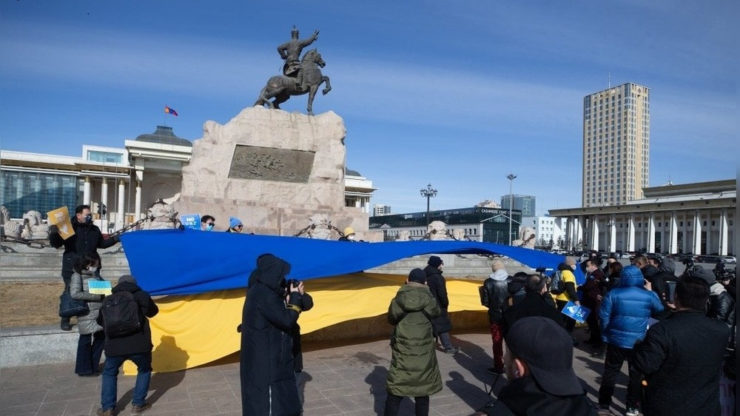
The Ukrainian situation is still being actively debated in Mongolia. However, a trend has emerged in Mongolian writings on this topic from the beginning of 2023: the Mongolian media and experts are increasingly talking about the prospects for resolving the crisis rather than the current crisis situation itself. Simultaneously, the ideas of Mongolia mediating a peaceful conclusion to the conflict are steadily gaining traction in the country. Currently these ideas are only circulated within the media and the community of experts, but they already have a big presence in the country’s media space.
On March 23, 2023, The Diplomat published an article by Mongolian analyst Tuvshinzaa Gantuulga proposing Mongolia as the best place for Russia-Ukraine peace negotiations. The author mentions Mongolia’s friendly relations with both countries, the presence of a “Ukrainian” and “Russian” phase in the lives of modern Mongolia’s four presidents, and the desire of its citizens to contribute to the resolution of the crisis. The article was reproduced in several additional Mongolian news outlets as well as on the personal profiles of important Mongolian residents.
The author’s conclusions are not without merit. Mongolia maintains strong and beneficial ties with both states. Russia is one of Mongolia’s most important political and economic allies, with whom it has a comprehensive strategic alliance. Ukraine, in turn, has been Mongolia’s “cooperation partner” since 2011.
Russia is Mongolia’s second economic partner, a significant supplier of electricity and fuel resources, and a key guarantor of the country’s foreign security, according to the Mongolians themselves. At the same time, Ukraine serves as an ideological “companion” for Mongolia, stating a desire for a “democratic society” and “maximization of sovereignty.” Assurances of Mongolian-Ukrainian relations’ partnership character were repeated during a recent phone discussion between the two countries’ presidents. Mongolian-Ukrainian relations cannot be treated outside the context of the “third neighbor policy” – maintaining a dialogue with Ukraine for Mongolia is a prerequisite for keeping favorable contacts with the United States and European countries in general.
It is also worth remembering that Mongolia has already offered its services as an international mediator. Previously, the Mongolian side presented its own negotiation platform for an inter-Korean settlement, citing amicable connections with the ROK and DPRK. By the way, the so-called “Ulaanbaatar Dialogue on Northeast Asian Security” initiative was created, among other things, to support a peaceful solution to the “Korean issue“. Later, in 2018, there were plans for a US-North Korea summit in Ulaanbaatar, Mongolia. Mongolia’s partnership with the two countries, its significant contribution to UN peacekeeping missions, its political and military neutrality, and even its unique religious values of harmony, concord, and pacifism all contributed to the “Mongolian negotiating platform’s” promise.
However, both ambitious projects were far from being realized for a number of reasons. First, they were created from the beginning as a loud statement about Mongolia’s peace-loving and progressive foreign policy guidelines, rather than as real action plans. There was no active discussion of the summit prospects with the leaders of the countries formally invited to Ulaanbaatar in either case. Second, in such cases, preference is frequently given to more well-known and popular venues, or those that have been agreed upon by the participants themselves. It is usually them who take the initiative to bargain.
Nonetheless, Mongolia’s proclamation of such ambitions more than served its genuine goals. Such evidence of Mongolia’s commitment to a peaceful solution, for example, has been very helpful in lending substance to its representatives’ declarations to international bodies, thereby sustaining the country’s favorable image in the international arena.
The idea to begin peace talks now, in the context of the Ukrainian crisis, is a reinforcement of Mongolia’s neutral posture, which is increasingly under attack from the outside. Mongolia has a significant need to maintain an unbiased position between the competing factions in the current global political context, and agreeing to hold peace talks without proposing specific terms is a very effective way to reinforce this neutrality.
Internal political “functionality” of such comments cannot be ruled out either. The majority of Mongolians, according to a recent survey by Sant Maral, think that keeping the country neutral is the wisest course of action. The government has nonetheless come under fire from a number of Mongolian citizens for the lack of “specificity” in Mongolia’s official stance on the Ukrainian situation. In this light, the concepts of Mongolian mediation spread through the media may be both an attempt to elicit the public’s opinion and a concretization of Mongolia’s as-yet-undefined neutrality by giving it useful and applicable content.
In any case, it appears unlikely that such an initiative will materialize and become official at this point. If such a plan is approved by the government, it will be utilized to uphold and enhance Mongolia’s positive and peaceful image and is unlikely to be presented to the leaders of Russia and Ukraine as a specific “business proposal.”
Boris Kushkhov, Department of Korea and Mongolia, Institute of Oriental Studies, the Russian Academy of Sciences, exclusively for the online magazine “New Eastern Outlook.”
Сообщение The Ukrainian Crisis: Mongolia as a Mediator? появились сначала на New Eastern Outlook.
 RSS Feed
RSS Feed















 April 19th, 2023
April 19th, 2023  Awake Goy
Awake Goy  Posted in
Posted in  Tags:
Tags: 













